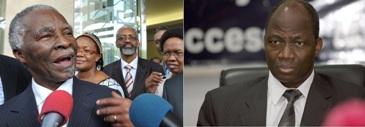Wikileaks: Mbeki fiercely critical of Darfur mediator Bassole
September 5, 2011 (WASHINGTON) – The former South African president Thabo Mbeki who is also the chairman of the African Union High Level Implementation Panel (AUHIP) expressed his deep frustration with the approach taken by the Darfur joint chief mediator Dijibril Bassole, reveals a leaked U.S. diplomatic cable.

The AUHIP chairman wanted to make Darfur peace file one of his key tasks and to include it in his holistic approach to end Sudan’s conflicts. He suggested to make Darfur civil society, tribal leaders and displaced population the main actors in a parallel peace process.
Bassole on the other hand was working to bring the rebel groups to the negotiating table in order to complement the Abuja peace agreement signed in May 2006 by another inclusive deal between the government and the armed movements.
Mbeki told Gration that the prospects for the peace talks in Doha led by Bassole and Qatar’s Minister of State for Foreign Affairs Ahmed Bin Abdullah Al-Mahmood “continue to proceed in a way that is not going to produce results”.
The AUHIP chairman characterized their approach as continually re-inventing the wheel and complained that he attempted to set up a meeting with Bassole since October 2009 without success. Mbeki said that he escalated the matter to the attention of AU and UN leadership in order to force Bassole to change his approach to no avail.
Inspired by the Truth and Reconciliation method applied after the end of Apartheid era in South Africa, Mbeki thought his idea of direct dialogue between the farmers and nomads will resolve the problem particularly in Darfur where the rebels are perceived as holders of regime change strategy more than seeking to defend the demand of victims.
For Bassolé who was facing difficulties to keep the government and rebels engaged in the talks, the civilian component had to participate in a parallel way in the process and to debate in the final stage with the two parties.
The “stakeholders” also have to participate in the post-Doha process by discussing and disseminating the main points of the agreement with the ground and create suitable environment for the implementation of the deal.
Mbeki said that that due to the Bassole and Al-Mahmood’s failure in creating a credible civil society forum, numerous Darfuri civil society leaders have approached the AUDP about the need to convene a conference on the ground in Darfur.
The former South African president planned the forum for March 2010 saying it would be constructive, because it’s clear that there is consensus on major issues for most Darfuris, including IDPs, civil society, refugees, native administration, and others.
Agreement on a wide range of issues by a broad swath of Darfuris should feed into the Doha process, but “due to Bassole’s approach this seems impossible,” he said, noting that the joint mediator is apparently trying to bring a selection of Darfurian civil society figures to Doha for additional consultations on March 28.
Khartoum signed a peace deal in Doha with small rebel group Liberation and Justice Movement (LJM) last July.
The two major rebel groups of Sudan Liberation Movement (SLM-Nur) as well as Justice and Equality Movement (JEM) remain outside the deal pushing analysts to attach little significance to the Qatar-brokered deal .
(ST)
